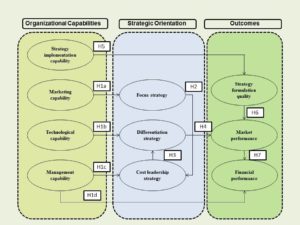Paulo César de Sousa Batista, Ph.D Universidade Estadual do Ceará, Fortaleza, CE, Brasil
João Veríssimo de Oliveira Lisboa, Ph.D Instituto de Sistemas e Robótica and Faculdade de Economia da Universidade de Coimbra Portugal
Mário Gomes Augusto, Doutor Instituto de Sistemas e Robótica and Faculdade de Economia da Universidade de Coimbra Portugal
Fátima Evaneide Barbosa de Almeida, Doutora Faculdade de Economia da Universidade de Coimbra Portugal
 The relationship between strategy and performance has been widely discussed over the past three decades (Venkatraman & Ramanujam, 1986; Ray, Barney, & Muhanna, 2004; Spanos, Zaralis & Lioukas, 2004; Hahn & Powers, 2010; Parnell, 2011). Hahn and Powers (2010) argue that, despite of the great importance given to an adequate strategy implementation for performance, the relationship between strategy formulation quality and its implementation did not receive the attention it deserved.
The relationship between strategy and performance has been widely discussed over the past three decades (Venkatraman & Ramanujam, 1986; Ray, Barney, & Muhanna, 2004; Spanos, Zaralis & Lioukas, 2004; Hahn & Powers, 2010; Parnell, 2011). Hahn and Powers (2010) argue that, despite of the great importance given to an adequate strategy implementation for performance, the relationship between strategy formulation quality and its implementation did not receive the attention it deserved.
Motivated by this lack of attention, the study intends to understand how the interaction between strategy capabilities (marketing, technology and management), strategy types, strategy formulation quality and implementation capability affects organizational performance in the Brazilian textiles companies. In this context, this study also aims to contribute to clarify the main driving strategic factors that explain the financial performance of the Brazilian textiles firms.
As a result of a broad review of strategy and firm performance literatures, the following conceptual framework was built to address the relationships of the major strategic factors and their effect on performance. In the model, this construct was described as a two dimensional phenomenon – market and financial – and was measured based on the researchers’ expectations compared to market and financial planned rates.
The results support links between focus strategy and marketing capabilities, and between cost leadership strategy and management capabilities. However, the relationship between technologic capabilities and differentiation strategy was not statistically significant, as one expected.
The ability to implement strategies strongly influences the quality of formulating strategies, stressing the importance that businesses adopt principles and patterns of behavior that may favor the implementation of strategies and ensure the quality of the next planning cycle.

The existence of an inter-relationship between generic strategies of focus, cost leadership and differentiation indicates the use of combined strategies. The strategies of cost leadership and focus have indirect effect on performance through differentiation strategy. It is as if companies adopt initially a focus strategy, after cost leadership strategy, and, then, differentiate.
These above results indicate that, in today’s highly competitive global environment, cost alone or differentiation alone is no longer sufficient as a competitive tool.
Regarding the effect on performance, the results stressed that managers should take in consideration that the differentiation strategy and the strategy formulation quality have a positive impact on market performance, and that management capability and market performance have a statistically significant relationship with financial performance.
Therefore, it seems that market performance works as an intermediary and necessary step to obtain financial performance in the textile industry.
To read the article, access
BATISTA, P. C. S., LISBOA, J. V. O., AUGUSTO, M. G. and ALMEIDA, F. E. B. Effectiveness of business strategies in Brazilian textile industry. Rev. Adm. (São Paulo) [online]. 2016, vol.51, n.2, pp.225-239. [viewed 25th July 2016]. ISSN 0080-2107. DOI: 10.5700/rausp1236. Available from: http://ref.scielo.org/jh498t
External link
Revista de Administração USP – RAUSP: www.scielo.br/rausp
Como citar este post [ISO 690/2010]:













Últimos comentários